|
|
|
Sort Order |
|
|
|
Items / Page
|
|
|
|
|
|
|
| Srl | Item |
| 1 |
ID:
143172
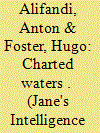

|
|
|
| 2 |
ID:
092138
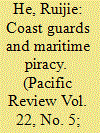

|
|
|
|
|
| Publication |
2009.
|
| Summary/Abstract |
Despite the efforts of the past decade, maritime piracy remains of international concern today. Countries need to cooperate actively at both the regional and international levels to eradicate the problem effectively. In particular, the nature of the threat in the Asia-Pacific region suggests that coastal states - countries that possess sovereignty over the pirate-infested waters but lack the law-enforcement resources - have to turn to resource-rich extra-regional powers for assistance. Unfortunately, cooperation between such disparate countries has traditionally been impeded by sovereignty sensitivities, as best exemplified by Malaysia's and Indonesia's hostile responses to the United States' Regional Maritime Security Initiative in 2003. Faced with this apparent dilemma, a new phenomenon has emerged. National coast guard agencies, instead of their military naval counterparts, have become attractive alternatives for promoting international cooperation against non-traditional security threats, such as maritime piracy. Spearheaded by the Japanese Coast Guard (JCG), coast guards from various countries have imparted training expertise, conducted joint exercises, hosted low-publicity multilateral meetings, and even transferred security equipment across international borders. Together they have succeeded in promoting cooperation without arousing the sovereignty sensitivities often associated with such cooperation. This article analyzes the evolution of coast guard cooperation in Asia, highlighting in particular the Japanese Coast Guard's success in this endeavor. With the general alignment of regional and global power interests in Southeast Asia, coast guard agencies hold promise for extra-regional powers wishing to help eradicate maritime piracy in the region.
|
|
|
|
|
|
|
|
|
|
|
|
|
|
|
|
| 3 |
ID:
104935
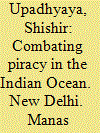

|
|
|
|
|
| Publication |
New Delhi, Manas Publications, 2011.
|
| Description |
140p.
|
| Standard Number |
9788171494096, hbk
|
|
|
|
|
|
|
|
|
|
|
|
Copies: C:1/I:0,R:0,Q:0
Circulation
| Accession# | Call# | Current Location | Status | Policy | Location |
| 056106 | 364.1640954/UPA 056106 | Main | On Shelf | General | |
|
|
|
|
| 4 |
ID:
087920
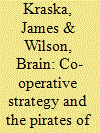

|
|
|
|
|
| Publication |
2009.
|
| Summary/Abstract |
Maritime piracy flourishes at the seams of globalisation because jurisdiction is unclear and pirates exploit the inherent isolation of individual vessels and nations. Given these dynamics, new international law and policy frameworks have become the most effective force multiplier for implementing a new collaborative approach, and the first test is the challenge posed by maritime piracy in the Horn of Africa.
|
|
|
|
|
|
|
|
|
|
|
|
|
|
|
|
| 5 |
ID:
112760


|
|
|
|
|
| Publication |
2012.
|
| Summary/Abstract |
Article 100 of the UN Convention on the Law of the Sea requires parties to "cooperate" against maritime piracy, but how this cooperation is to be achieved is undefined. Enforcement is a public good-creating uncompensated benefits for others, thus suffering from free rider problems. The analysis in this article explains why more pirates captured are released than prosecuted, why the United Nations and the International Maritime Organization are seeking to reduce enforcement costs, why some in the shipping industry want to apply the 1988 Convention Against Terrorism at Sea, and why still others want to move prosecution of pirates from national courts to an international court.
|
|
|
|
|
|
|
|
|
|
|
|
|
|
|
|
| 6 |
ID:
187403
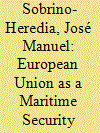

|
|
|
|
|
| Summary/Abstract |
This article analyzes piracy and banditry in the Gulf of Guinea, which in the last two decades have increased and which threaten freedom of navigation and fishing activities in the area. The situation is exacerbated by the absence of minimally effective maritime security in the region, in contrast to other areas of the world such as the Indian Ocean. Coastal states in the region are trying to cooperate to combat piracy and armed robbery in these waters. However, such initiatives are not a sufficient response to the scale of violence at sea. Therefore, actors outside the region, such as the European Union, have initiated action aimed at supporting these efforts and contributing to improving maritime security in the Gulf of Guinea. These initiatives have been channeled through a strategy that includes the coordinated maritime presence of naval forces in this maritime area.
|
|
|
|
|
|
|
|
|
|
|
|
|
|
|
|
| 7 |
ID:
160211
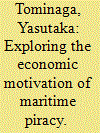

|
|
|
|
|
| Summary/Abstract |
This paper presents two hypotheses regarding the relationship between marine fisheries and maritime piracy. These hypotheses are based on the opportunity and willingness framework and describe how fish values and production can drive fishermen to engage in illegal activities, and the mechanisms that their capabilities and choices make available to them stipulate the forms that piracy takes when facing a declining fishing economy. The hypotheses are tested with the Maritime Piracy Data (MPD) using the negative binomial regression and the bivariate Poisson model. This study uses the instrumental variable approach to deal with endogeneity through two instruments: chlorophyll concentrations and temperature. The statistical analysis shows that unsophisticated piracy attacks are sensitive to fish production, but sophisticated attacks can be affected by both fish production and fish values and depend on the opportunity cost of existing fisheries and finding work in other industries.
|
|
|
|
|
|
|
|
|
|
|
|
|
|
|
|
| 8 |
ID:
131328


|
|
|
|
|
| Publication |
2014.
|
| Summary/Abstract |
Piracy in international waters is on the rise again, in particular off the coast of Somalia. While the dynamic game between pirates, ship-owners, insurance firms and the military seems to have reached some kind of equilibrium, piracy risks generating significant negative externalities to third parties (e.g. in terms of environmental hazards and terrorism), justifying attempts to contain it. We argue that these attempts may benefit from a look back - through the analytical lens of rational choice theory - to the most successful counterpiracy campaign ever undertaken, namely, the one led by the Roman general Gnaeus Pompeius Magnus (Pompey the Great) in 67 BC.
|
|
|
|
|
|
|
|
|
|
|
|
|
|
|
|
| 9 |
ID:
086814
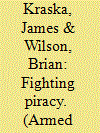

|
|
|
|
|
| Publication |
2009.
|
| Summary/Abstract |
Maritime piracy has experienced a renaissance not seen since the period of the Barbary pirates. Last year, more than 80 ships were hijacked off the dangerous waters of Somalia, and the ransom for some vessels fetches several million dollars.
|
|
|
|
|
|
|
|
|
|
|
|
|
|
|
|
| 10 |
ID:
152299


|
|
|
|
|
| Summary/Abstract |
A prominent explanation of the resource–conflict relationship suggests that natural resources finance rebellion by permitting rebel leaders the opportunity to purchase weapons, fighters, and local support. The bunkering of oil in the Niger Delta by quasi-criminal syndicates is an example of how the black-market selling of stolen oil may help finance anti-state groups. More systematic assessments have also shown that the risk and duration of conflict increases in the proximity of oil and diamond deposits. Yet despite the emphasis on rebel resource extraction in these arguments, empirical assessments rely almost exclusively on latent resource availability rather than actual resource extraction. Focusing on maritime piracy, this article argues that piracy is a funding strategy neglected in current research. Anecdotal evidence connects piracy in the Greater Gulf of Aden to arms trafficking, the drug trade, and human slavery. The revenue from attacks may find its way to Al-Shabaab. In Nigeria, increasing attacks against oil transports may signal an effort by insurgents to use the profits from piracy as an additional revenue stream to fund their campaign against the Nigerian government. The article hypothesizes that piracy incidents, that is, actual acts of looting, increase the intensity of civil conflict. Using inferential statistics and predictive assessments, our evidence from conflicts in coastal African and Southeast Asian states from 1993 to 2010 shows that maritime piracy increases conflict intensity, and that the inclusion of dynamic factors helps improve the predictive performance of empirical models of conflict events in in-sample and out-of-sample forecasts.
|
|
|
|
|
|
|
|
|
|
|
|
|
|
|
|
| 11 |
ID:
092705
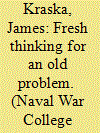

|
|
|
| 12 |
ID:
117022
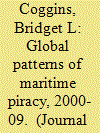

|
|
|
|
|
| Summary/Abstract |
This article introduces the Maritime Piracy Data (MPD), a dataset dedicated to understanding the nature, dynamics, and causes of contemporary piracy and armed robbery against ships. Data on maritime piracy are presented in two formats: an event set and an annual, country-level set. The event data track every maritime piracy attack reported to the International Maritime Bureau's Piracy Reporting Center (IMB/PRC) for a total of 3,413 events between 2000 and 2009. Entries provide event details including date, geo-coded location, attacker nationality, victim nationality, success, vessel type, violence level, loot taken, and/or ransom demanded. The annual data count the number of piracy events emanating from the world's 147 coastal countries over the same decade for a total of 1,470 observations. Entries include country-level information regarding the maritime sector including coastal shipping traffic, coastline length, seaports, distances to major sea lane chokepoints, and merchant marine size. The article describes the main features of the data, provides descriptive statistics, and briefly illustrates their potential utility for research. The MPD has potential utility for scholars examining non-traditional threats generated by non-state actors; for those studying the potential relationships between governance and conflict on land and piracy at sea; and for individuals engaged in policy-relevant analyses evaluating the effectiveness and efficiency of counter-piracy strategies and tactics.
|
|
|
|
|
|
|
|
|
|
|
|
|
|
|
|
| 13 |
ID:
170265
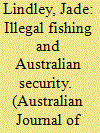

|
|
|
|
|
| Summary/Abstract |
The security impact of illegal fishing is not well understood. Where illegal fishing is recognised as a security problem, the focus has been on fish as a natural resource, the depletion of which can have impacts on food security, individual livelihoods, and the economic survival of states relying on illegal fishing. We argue that a focus on fish as a natural resource obscures the other security challenges the crime of illegal fishing poses to Australia. As this paper explains, illegal fishing overlaps with drug, human, weapon and other contraband trafficking and smuggling; irregular maritime arrivals; and maritime piracy. In addition, like other easily transported, high value resources, illegal fish can fund insurgencies and other types of political violence. Understanding illegal fishing as a security challenge will improve Australia’s national security policy. First, it acknowledges fish as a vital natural resource, implicated in economic, ecological, and human security; second, it analyses how illegal fishing interlinks with other maritime crimes; third, it challenges the effectiveness of monitoring and enforcement of illegal fishing; fourth, it presents an opportunity for effective regional cooperation; and finally it highlights the benefits of regional cooperation in responding to illegal fishing.
|
|
|
|
|
|
|
|
|
|
|
|
|
|
|
|
| 14 |
ID:
181740
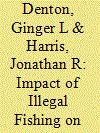

|
|
|
|
|
| Summary/Abstract |
The recent increase in maritime piracy is often associated with economic issues such as a decline in the fishing industry, but there is still no consensus on whether a decrease in local fishing causes a rise in piracy rates. We introduce the use of unreported fish catch and fishing industry type in addition to reported fish catch in Gulf of Guinea waters when analyzing factors influencing West African piracy. Using a newly released data set, which includes Illegal, Unregulated, and Unreported (IUU) fish catch by sector, we show that an increase in reported and unreported fishing yields an increase in piracy. Further, we find that increases in industrial fish catch are related to increases in maritime piracy while the opposite is true of artisanal and subsistence fish catch. We expect this new approach will highlight the impact of IUU and large-scale industrial fishing on piracy throughout the entire world.
|
|
|
|
|
|
|
|
|
|
|
|
|
|
|
|
| 15 |
ID:
125105
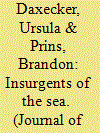

|
|
|
|
|
| Publication |
2013.
|
| Summary/Abstract |
While piracy may evoke romanticized visions of swashbuckling, rum swigging, and skirt chasing pirates hoisting the Jolly Roger, maritime piracy has changed substantially by taking advantage of modernization and substantial upgrading of the weapons, vessels, and weapons it employs. In addition, as documented by the International Maritime Bureau (IMB), the frequency of pirate attacks has increased significantly, with more than 2,600 piracy incidents occurring since 2004. The authors argue that piracy is a result of permissive institutional environments and the lack of legal forms of employment in states' fishing sectors. The authors investigate these arguments empirically using data for all countries with coastlines in the 1995-2007 period. The empirical analyses show that state weakness and reductions in fisheries production values affect piracy as expected. These findings suggest that international efforts in combating piracy should center on improving the institutional environments and labor opportunities driving maritime piracy.
|
|
|
|
|
|
|
|
|
|
|
|
|
|
|
|
| 16 |
ID:
159424
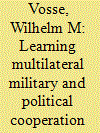

|
|
|
|
|
| Summary/Abstract |
n January 2009, the Japanese government decided to join the multilateral-force counter-piracy operations in the Gulf of Aden and the coast of Somalia and has since then developed into one of the most active and involved forces combatting maritime piracy. This special issue defines de-centering as a ‘process of moving away from a state of centering by building relationships with other partners’ through ‘security and defense consultations and dialogues’. This article argues that this counter-piracy mission involved many if not all of these components and can be seen as an important opportunity for Japan to deepen its understanding of forces and governments of countries and forces other than the United States in various dialogue and coordination forums, joint capacity building, and joint training exercises. While it is not argued that this will in any way weaken US–Japan relations or the role of the United States as Japan's main security guarantor, it demonstrates that Japan and the Self Defense Forces can become a security partner for countries in Europe or NATO. This potentially gives Japan more options whether to support or not support specific foreign policy decisions by the United States, a condition for de-centering.
|
|
|
|
|
|
|
|
|
|
|
|
|
|
|
|
| 17 |
ID:
112191
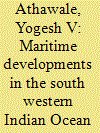

|
|
|
|
|
| Publication |
2012.
|
| Summary/Abstract |
The Indian Ocean region, being a vast geographical entity, is composed of various regional and sub-regional entities. This article addresses prominent maritime developments in the South Western Indian Ocean (SWIO) region of the Indian Ocean Rim and highlights the multi-dimensional growth of strategic maritime activities in the region. The developments, which range from security cooperation among nations to a rise in maritime piracy and regional cooperation for fisheries management, lend a distinct maritime perspective to the emerging geostrategic and economic discourse in this oceanic region of East Africa, dotted as it is with island and coastal states. The article then juxtaposes these prominent developments with the main concerns of the maritime states and their efforts to meet the challenges posed by the developments. The article also brings out the relevance of these concerns in the context of India's military maritime strategy and foreign policy goals in the region, underscoring the self-evident case for a more focused and multi-pronged engagement with the region, to harness the potential of mutually beneficial cooperation across various maritime disciplines. The likely areas of cooperation are discussed, with emphasis on the advantages that could accrue to India from these endeavours.
|
|
|
|
|
|
|
|
|
|
|
|
|
|
|
|
| 18 |
ID:
191500
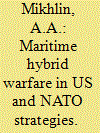

|
|
|
|
|
| Summary/Abstract |
This paper elucidates the essence and content of possible maritime hybrid warfare of the US and NATO against Russia based on a unified system of new challenges and threats: terrorism at sea, piracy, drug trafficking, illegal migration, cybercrime, etc. It also proposes some preventive countermeasures to ensure the security of maritime economic activities of the Russian Federation (RF).
|
|
|
|
|
|
|
|
|
|
|
|
|
|
|
|
| 19 |
ID:
192062
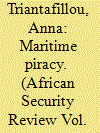

|
|
|
|
|
| Summary/Abstract |
Τhe global economic downturn during the pandemic and the current geopolitical tensions may be marking a resurgence in maritime piracy, rendering close examination of its determinants useful for the international shipping industry and for policymakers. We contribute to pertinent literature by focusing on legal factors that affect sea piracy in Nigeria and Somalia, two countries that feature prominently among the traditional piracy hotspots of West and East Africa respectively. Using data for the period 2002–2020 and panel estimation, we assert prior research by finding institutional factors, mainly corruption, and socioeconomic factors, notably youth unemployment, being conducive to maritime piracy. Specifically, we find institutional factors to be more important for Nigeria, while socioeconomic factors to stand out in the case of Somalia. The results obtained confirm our key hypothesis that in both cases examined pirates have a preference to attack ships with Western European countries’ flags, where legislation tends to be less severe in terms of punishment for the crime of maritime piracy. Our findings support the argument that to discourage pirates from exploiting differences in national legal frameworks worldwide, deterrence of maritime piracy needs to be coordinated at the international level.
|
|
|
|
|
|
|
|
|
|
|
|
|
|
|
|
| 20 |
ID:
114383
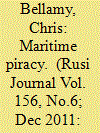

|
|
|
|
|
|
|
|